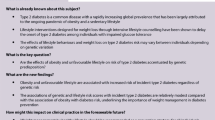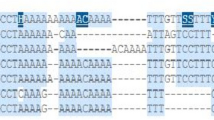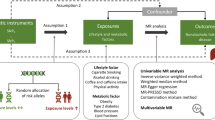Abstract
Background
Peroxisome proliferator-activated receptors (PPAR) are implicated in pathogenesis of insulin resistance and cancers of the digestive system.
Aim
We investigated the associations of single nucleotide polymorphisms (SNPs) of PPAR δ and γ with gastric cancer and explored interactions with risk factors of gastric cancer.
Methods
We conducted our analysis in a case–control study of 196 gastric cancer patients and 397 controls residing in the Taixing region of Jiangsu, China. Six SNPs in the PPARδ (rs2076167, rs3734254) and PPARγ genes (rs10865710, rs1801282, rs3856806, rs13306747) were genotyped. We employed logistic regression to evaluate the association between each genotype and gastric cancer and tested for gene–environment interaction with Helicobacter pylori (H. pylori) infection, smoking status, and meat and salt intake.
Results
We found that the G/G variant rs2076167, in tight linkage disequilibrium with rs3734254 (R 2 = 0.97), was associated with increased risk of gastric cancer in a recessive model (OR 2.20, 95 % CI 1.12, 4.32). The association between G/G variant of rs2016167 and gastric cancer was particularly strong among those with higher salt intake (OR 5.11, 95 % CI 1.11, 23.5), but did not vary by H. pylori infection or smoking status.
Conclusion
We found that genetic variants of PPARδ were associated with gastric cancer. If the association is confirmed in larger studies, it may implicate a role for PPARδ activators, such as insulin-sensitizing agents, in prevention of gastric cancer.
Similar content being viewed by others
References
GLOBOCAN 2008 v2.0. Cancer incidence and mortality worldwide [database on the Internet]. International Agency for Research on Cancer. 2010. Available from: http://globocan.iarc.fr. Accessed 10 May 2013.
Bray F, Ren JS, Masuyer E, Ferlay J. Global estimates of cancer prevalence for 27 sites in the adult population in 2008. Int J Cancer. 2013;132:1133–1145.
Terry MB, Gaudet MM, Gammon MD. The epidemiology of gastric cancer. Semin Radiat Oncol. 2002;12:111–127.
Guilford P, Hopkins J, Harraway J, et al. E-cadherin germline mutations in familial gastric cancer. Nature. 1998;392:402–405.
Youssef J, Badr M. Peroxisome proliferator-activated receptors and cancer: challenges and opportunities. Br J Pharmacol. 2011;164:68–82.
Peters JM, Gonzalez FJ. Sorting out the functional role(s) of peroxisome proliferator-activated receptor-beta/delta (PPARbeta/delta) in cell proliferation and cancer. Biochim Biophys Acta. 2009;1796:230–241.
Girroir EE, Hollingshead HE, He P, Zhu B, Perdew GH, Peters JM. Quantitative expression patterns of peroxisome proliferator-activated receptor-beta/delta (PPARbeta/delta) protein in mice. Biochem Biophys Res Commun. 2008;371:456–461.
Prasad KN, Saxena A, Ghoshal UC, Bhagat MR, Krishnani N. Analysis of Pro12Ala PPAR gamma polymorphism and Helicobacter pylori infection in gastric adenocarcinoma and peptic ulcer disease. Ann Oncol. 2008;19:1299–1303.
Tahara T, Arisawa T, Shibata T, et al. Influence of peroxisome proliferator-activated receptor (PPAR) gamma Plo12Ala polymorphism as a shared risk marker for both gastric cancer and impaired fasting glucose (IFG) in Japanese. Dig Dis Sci. 2008;53:614–621.
Larsson SC, Orsini N, Wolk A. Processed meat consumption and stomach cancer risk: a meta-analysis. J Natl Cancer Inst. 2006;98:1078–1087.
Villegas R, Yang G, Liu D, et al. Validity and reproducibility of the food-frequency questionnaire used in the Shanghai men’s health study. Br J Nutr. 2007;97:993–1000.
Shu XO, Yang G, Jin F, et al. Validity and reproducibility of the food frequency questionnaire used in the Shanghai Women’s Health Study. Eur J Clin Nutr. 2004;58:17–23.
Colmers IN, Bowker SL, Johnson JA. Thiazolidinedione use and cancer incidence in type 2 diabetes: a systematic review and meta-analysis. Diabetes Metab. 2012;38:475–484.
Wu CW, Yu J, Sung JJ. Peroxisome proliferator-activated receptor delta and gastric cancer (review). Oncol Rep. 2009;22:451–457.
Shan W, Nicol CJ, Ito S, et al. Peroxisome proliferator-activated receptor-beta/delta protects against chemically induced liver toxicity in mice. Hepatology. 2008;47:225–235.
Harman FS, Nicol CJ, Marin HE, Ward JM, Gonzalez FJ, Peters JM. Peroxisome proliferator-activated receptor-delta attenuates colon carcinogenesis. Nat Med. 2004;10:481–483.
Reed KR, Sansom OJ, Hayes AJ, et al. PPARdelta status and Apc-mediated tumourigenesis in the mouse intestine. Oncogene. 2004;23:8992–8996.
Barak Y, Liao D, He W, et al. Effects of peroxisome proliferator-activated receptor delta on placentation, adiposity, and colorectal cancer. Proc Natl Acad Sci USA. 2002;99:303–308.
Gupta RA, Wang D, Katkuri S, Wang H, Dey SK, DuBois RN. Activation of nuclear hormone receptor peroxisome proliferator-activated receptor-delta accelerates intestinal adenoma growth. Nat Med. 2004;10:245–247.
Wang XQ, Terry PD, Yan H. Review of salt consumption and stomach cancer risk: epidemiological and biological evidence. World J Gastroenterol. 2009;15:2204–2213.
Kumar AP, Quake AL, Chang MK, et al. Repression of NHE1 expression by PPAR gamma activation is a potential new approach for specific inhibition of the growth of tumor cells in vitro and in vivo. Cancer Res. 2009;69:8636–8644.
Fais S, De Milito A, You H, Qin W. Targeting vacuolar H+ ATPases as a new strategy against cancer. Cancer Res. 2007;67:10627–10630.
Cavaleiro-Pinto M, Peleteiro B, Lunet N, Barros H. Helicobacter pylori infection and gastric cardia cancer: systematic review and meta-analysis. Cancer Causes Control. 2011;22:375–387.
Camorlinga-Ponce M, Flores-Luna L, Lazcano-Ponce E, et al. Age and severity of mucosal lesions influence the performance of serologic markers in Helicobacter pylori-associated gastroduodenal pathologies. Cancer Epidemiol Biomarkers Prev. 2008;17:2498–2504.
Acknowledgments
This project is supported by the Grant CA09412 from the National Cancer Institute, and ES 011667 from the National Institute of Environmental Health Sciences, the International Union Against Cancer (UICC) Technology Transfer fellowship (ICRETT) awarded to Dr. Li-Na Mu, as well as a NIH/NCI postdoctoral fellowship (R25 CA 87949) awarded to Dr. Christie Jeon. The study was also partially supported by the Alper Program of Environmental Genomics of UCLA’s Jonsson Comprehensive Cancer Center.
Conflict of interest
None.
Author information
Authors and Affiliations
Corresponding author
Rights and permissions
About this article
Cite this article
Jeon, C., Chang, SC., Mu, L. et al. Genetic Variants of Peroxisome Proliferator-Activated Receptor δ Are Associated with Gastric Cancer. Dig Dis Sci 58, 2881–2886 (2013). https://doi.org/10.1007/s10620-013-2770-2
Received:
Accepted:
Published:
Issue Date:
DOI: https://doi.org/10.1007/s10620-013-2770-2




